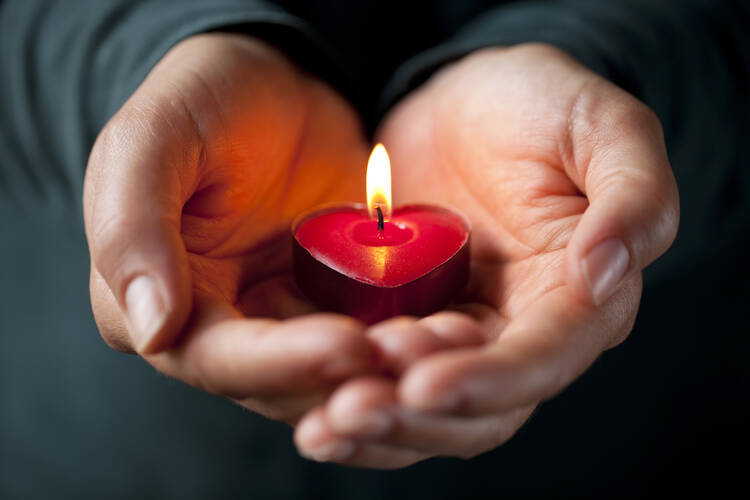Indulging in a midnight scroll on TikTok, I paused my twiddling thumb amid cooking videos and New York City apartment tours at a video of a young woman. She spoke directly to the camera and said, “So what you and I are going to do is pray for your future husband. Get ready. Virtually hold my hands, girl.” To the tune of gentle piano, she closed her eyes, stretched her hands out toward the screen and began what appeared to be an impromptu prayer about “a God who is on time.” She spoke to God on my behalf, praying that my “future husband” will be an upright and faithful person who comes into my life in God’s time.
A glimmer of hope in the online world of TikTok? Not so fast. The music then cut out: “And I pray that if he is dating someone, that you’re going to make them break up.”
I closed the app and caught a glimpse of my confused countenance in the black reflection of my phone screen. What did I just watch? I don’t want God to make anyone break up (can that even happen?), and I certainly don’t want it to be my doing just because I prayed with a stranger.
This idea of praying for a future husband, or partner for that matter, is not a novel one, nor is it limited to the online world. Prayer books, including one simply titledPraying for Your Future Husband, abound in the genre of prayer materials marketed towards single Christian women. At the heart of these prayer books is the idea that single women can pray for the spiritual development of their future husbands. But these prayers have taken on a new twist among online influencers. Rather than praying for the well-being of a person one has yet to meet, many influencers are venturing into the quasi-spiritual world of manifestation.
Because I watched that entire video, the TikTok algorithm, assuming I would enjoy similar content, fed me more praying for future husband videos, some comforting, and plenty strange.
One included a video of a young woman lipsyncing to a Lana Del Rey song, the lyrics “when you know you know” crooning over text on a screen that read: “Single girlies: create a secret password/phrase with God that your future boyfriend/husband will say to you and you’ll know that’s the one God sent for you.” The video caption offered additional advice: “Make it really random/uncommon, pray about it, and write it in your notes app so you don’t forget.”
Was what I just watched a kind of prayer “tip” or “technique” or something else entirely? I’ve prayed these kinds of “petition prayers” in the past, asking God to bring about something that I wanted. Asking God for things during prayer has often felt childish, but as my colleague James Martin, S.J., wrote in his book Learning to Pray, “There is nothing wrong with asking God for help; it’s both human and natural.”
But believing that we can will something to happen purely through our own thoughts is another matter. I scrolled through numerous videos marked #prayingforhusband, and one word continued to appear in the chain of hashtags connected to them: #manifest.
Manifestation is different from prayer, though the two often are conflated and confused by those unfamiliar with either practice. Manifestation is a thought exercise dating back to the 19th-century and the New Thought spiritual movement, which posited that the state of one’s mind could affect the well-being of the body.
Today, versions of this thinking have spawned sensations like The Secret, and the idea has expanded to mean simply that our thoughts can literally create our reality. People practicing manifestation try to will things into existence by focusing their attention on their desires. Sometimes this takes the form of repeatedly writing down a word or a phrase that describes your desire in a journal. Sometimes the ritual involves candles or crystals to harness positive energy. Sometimes it involves saying what you desire aloud as if it has already happened: “I got a job promotion. I am in a loving relationship.”
Manifesting culture has been on the rise in recent years with Google searches of “manifesting” spiking 600 percent since the beginning of the pandemic. On Instagram, the hashtags #manifest and #manifestation now total more than 15 million posts, and on TikTok they surpass nine billion.
Which brings me back to my experience watching those TikTok videos. I was praying for a stranger with a stranger. I didn’t even know what this supposed “future husband” looked like; and the experience felt distant, forced and, frankly, slightly creepy. I definitely don’t believe I can manifest a husband. But can I pray for my future husband? Should I?
What is Prayer?
Walter Burghardt, S.J., describes prayer as “a long, loving look at the real.” In this light, prayer is a continuous effort and a practice that grows and changes as our understanding of our faith and ourselves grows and changes. This could mean that we will change the way we pray throughout our lives, as we change and as our relationship with God changes: a recitation of short prayers memorized from childhood, casual conversations with God, praying with sacred texts or petition prayers. In Father Burghardt’s vision, prayer connects us to God, who is love. Prayer is always done in the context of love. And prayer looks at the reality of our lives, all the good and the not-so-good parts and approaches them with the love and mercy that God has for us, his beloved children.
Looking at the real and forming an interior posture of both humility and love challenges us to see ourselves as God sees us. Prayer and humility are inextricably connected. Humility helps us to recognize the meaning in the reality of our lives. Prayer helps us to recognize the pieces of our identity that draw us nearer to or push us further from God.
But the reality of those who may want to pray for their future partner is that they currently do not have a partner. Here, we must remember that the humility brought about by prayer also helps us acknowledge a simple truth: God knows more than I do. My entire reality is already known to God, even though parts of that reality have not been revealed to me yet. God exists out of time. Praying for someone in the future may seem dissonant because we do not know that person. But God does, and that means our prayers “make sense” to God, even if our petitions have yet to be fulfilled on earth. No prayer is ever wasted.
Praying for a Future Partner
In Pope Francis’ apostolic exhortation “Rejoice and Be Glad,” he cautions against Pelagianism, a modern iteration of the heresy that asserts that we can achieve, through our own endeavors, what only God’s grace and mercy can accomplish. Manifesting a future partner and willing them into our lives can be an overstep and a misunderstanding of the divine nature of love. “Knock and the door will be opened” (Mt 7:8) provides a distinction between the two. Manifestation says that by simply thinking about knocking, you can make the door open. Prayer says that we must do the work of knocking, but that God opens the door.
It is human nature to try to impose order on the chaos of life, to try to control our destiny. But prayer requires us to acknowledge our humble place in God’s plan, that while we can voice our desires, we also must surrender them to God’s will. Prayer helps us to see that God’s love and understanding of our earthly lives supersedes whatever we may try to will into existence on our own terms. Manifestation, on the other hand tries to harness our own thoughts in a way that centers the individual as a “creator.” But prayer turns over our lives, our plans and our hopes to the Creator.
We not only can but should pray for people whom we have not met yet. Prayer that actively wills the good of another person is never wasted and never seems strange to God. In this way, praying for the contentment of a future partner, wherever and whenever they might be in the reality of their own lives, is an act of love. This does not mean we should pray for them to end a relationship they may currently be in, as that TikTok creator suggested. But prayer that authentically centers God’s will in our lives can be a great gift to a future partner. And we may find comfort in the fact that, wherever our lives lead, our desires are in the hands of a God with an omnipotent perspective and an all-encompassing love beyond what we can understand.








